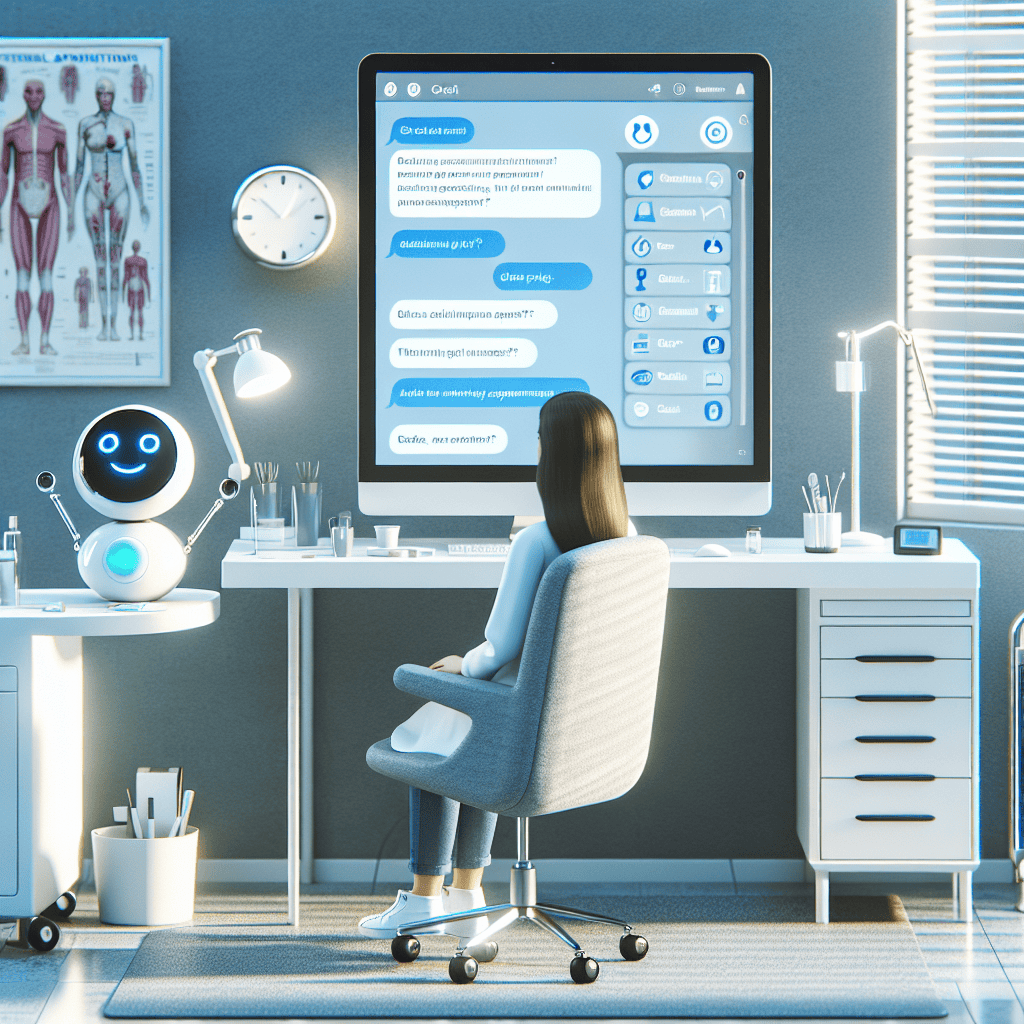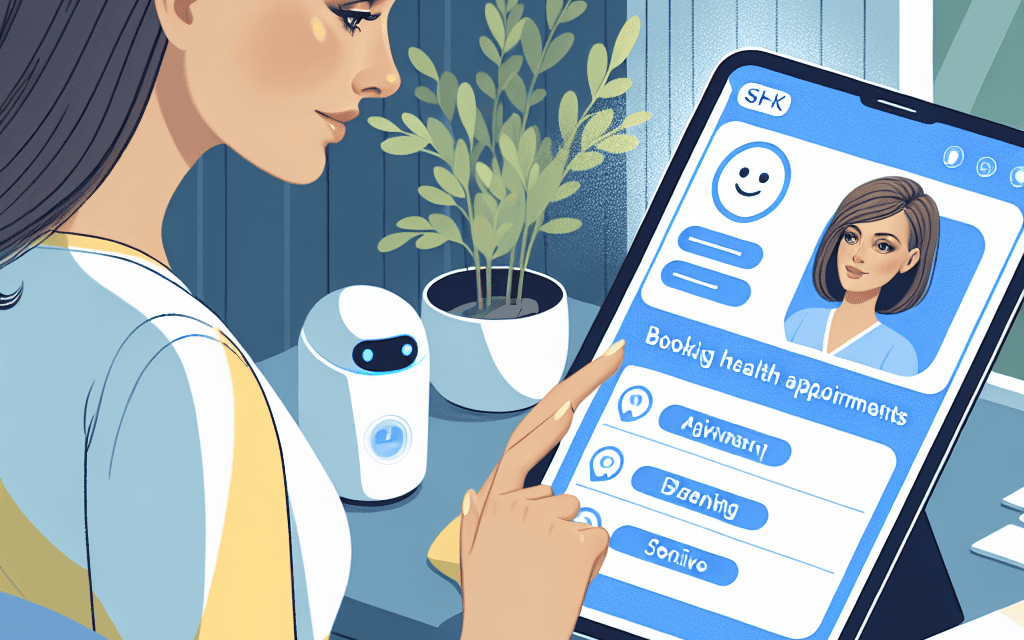Chatbots Ease Appointment Anxiety for Patients with Sensitive Health Concerns

In the digital age, healthcare is undergoing a significant transformation, with technology playing a pivotal role in enhancing patient experiences. One of the most promising innovations is the use of chatbots to alleviate appointment anxiety, particularly for patients with sensitive health concerns. This article delves into how chatbots are revolutionizing patient interactions, providing comfort, and improving healthcare outcomes.
The Rise of Chatbots in Healthcare
Chatbots have become an integral part of various industries, and healthcare is no exception. These AI-driven tools are designed to simulate human conversation, providing users with instant responses and assistance. In healthcare, chatbots are increasingly being used to streamline processes, offer medical advice, and support patient engagement.
The adoption of chatbots in healthcare is driven by several factors:
- Advancements in artificial intelligence and natural language processing.
- The need for efficient patient management systems.
- Increasing demand for personalized healthcare experiences.
- Rising healthcare costs and the need for cost-effective solutions.
According to a report by Grand View Research, the global healthcare chatbot market size was valued at USD 122.0 million in 2020 and is expected to expand at a compound annual growth rate (CAGR) of 25.1% from 2021 to 2028. This growth is indicative of the increasing reliance on chatbots to enhance healthcare delivery.
Case Study: Babylon Health
Babylon Health, a UK-based digital health service provider, has successfully integrated chatbots into its platform to offer virtual consultations and health assessments. Their AI-powered chatbot can analyze symptoms and provide users with potential diagnoses, reducing the need for immediate in-person consultations. This approach not only eases appointment anxiety but also empowers patients to make informed decisions about their health.
Understanding Appointment Anxiety
Appointment anxiety is a common issue faced by patients, particularly those with sensitive health concerns. This anxiety can stem from various factors, including fear of diagnosis, embarrassment, and uncertainty about the medical process. For some, the mere thought of discussing personal health issues with a healthcare professional can be overwhelming.
Several studies have highlighted the prevalence of appointment anxiety:
- A study published in the Journal of General Internal Medicine found that 30% of patients experience anxiety before medical appointments.
- Research by the Anxiety and Depression Association of America (ADAA) indicates that health-related anxiety affects approximately 40 million adults in the United States.
For patients with sensitive health concerns, such as mental health issues, sexual health, or chronic illnesses, appointment anxiety can be particularly pronounced. This anxiety can lead to delayed appointments, missed consultations, and, ultimately, poorer health outcomes.
Impact on Patient Health
The impact of appointment anxiety on patient health cannot be overstated. When patients avoid or delay seeking medical care due to anxiety, they risk exacerbating their health conditions. This can lead to more severe symptoms, increased healthcare costs, and a diminished quality of life.
Moreover, appointment anxiety can hinder effective communication between patients and healthcare providers. Patients may withhold important information or fail to ask critical questions, leading to misdiagnoses or inadequate treatment plans.
How Chatbots Alleviate Appointment Anxiety
Chatbots offer a promising solution to appointment anxiety by providing patients with a non-judgmental, accessible, and convenient platform to address their health concerns. Here are several ways chatbots help ease appointment anxiety:
1. Providing Immediate Support and Information
One of the primary benefits of chatbots is their ability to provide immediate support and information to patients. Unlike traditional healthcare systems, which may require patients to wait for appointments or phone consultations, chatbots are available 24/7. This accessibility allows patients to seek information and reassurance at any time, reducing anxiety associated with waiting for medical advice.
For example, a patient experiencing symptoms of a sensitive health issue can use a chatbot to receive preliminary information about their condition. This can help alleviate fears and provide a sense of control over their health situation.
2. Facilitating Anonymous Interactions
For patients with sensitive health concerns, anonymity can be a crucial factor in seeking medical advice. Chatbots offer a level of privacy that traditional healthcare interactions may not provide. Patients can discuss their symptoms and concerns without fear of judgment or embarrassment, which can be particularly beneficial for issues related to mental health, sexual health, or stigmatized conditions.
This anonymity encourages patients to be more open and honest about their health concerns, leading to more accurate assessments and recommendations.
3. Streamlining Appointment Scheduling
Appointment scheduling can be a significant source of anxiety for patients, particularly when dealing with complex healthcare systems. Chatbots simplify this process by allowing patients to schedule, reschedule, or cancel appointments with ease. This convenience reduces the stress associated with navigating healthcare systems and ensures that patients receive timely care.
Moreover, chatbots can send reminders and notifications to patients, helping them stay organized and reducing the likelihood of missed appointments.
4. Offering Emotional Support
In addition to providing medical information, chatbots can offer emotional support to patients experiencing anxiety. Through empathetic language and personalized interactions, chatbots can help patients feel understood and supported. This emotional connection can be particularly valuable for patients who may not have access to traditional support systems.
For instance, Woebot, a mental health chatbot, uses cognitive-behavioral therapy techniques to help users manage anxiety and depression. By providing a safe space for users to express their feelings, Woebot helps reduce appointment anxiety and encourages proactive mental health management.
5. Enhancing Patient Education
Education is a powerful tool in reducing appointment anxiety. Chatbots can provide patients with comprehensive information about their health conditions, treatment options, and what to expect during medical appointments. This knowledge empowers patients to take an active role in their healthcare journey and reduces the fear of the unknown.
By offering educational resources and answering common questions, chatbots help demystify the healthcare process and build patient confidence.
Challenges and Limitations of Chatbots in Healthcare
While chatbots offer numerous benefits in alleviating appointment anxiety, they are not without challenges and limitations. Understanding these challenges is crucial for optimizing chatbot implementation in healthcare settings.
1. Ensuring Accuracy and Reliability
One of the primary concerns with healthcare chatbots is ensuring the accuracy and reliability of the information they provide. Inaccurate or misleading information can have serious consequences for patient health. Therefore, it is essential for chatbots to be developed and maintained by healthcare professionals and regularly updated with the latest medical guidelines.
Moreover, chatbots should be designed to recognize their limitations and direct users to seek professional medical advice when necessary.
2. Addressing Privacy and Security Concerns
Privacy and security are paramount in healthcare, and chatbots must adhere to strict data protection regulations. Patients need to trust that their personal information and health data are secure when interacting with chatbots. This requires robust encryption, secure data storage, and compliance with regulations such as the Health Insurance Portability and Accountability Act (HIPAA) in the United States.
Healthcare providers must prioritize transparency and inform patients about how their data will be used and protected.
3. Overcoming Technological Barriers
While chatbots are becoming more sophisticated, they still face technological limitations. Natural language processing, for example, may struggle to accurately interpret complex medical terminology or understand nuanced patient concerns. This can lead to misunderstandings or inadequate responses.
Continuous advancements in AI and machine learning are necessary to improve chatbot capabilities and ensure they can effectively address a wide range of patient needs.
4. Balancing Automation with Human Interaction
While chatbots offer convenience and efficiency, they cannot replace the empathy and expertise of human healthcare providers. It is essential to strike a balance between automation and human interaction, ensuring that patients have access to personalized care when needed.
Chatbots should be integrated into healthcare systems as complementary tools that enhance, rather than replace, human interactions.
5. Addressing Digital Literacy and Accessibility
Not all patients have the same level of digital literacy or access to technology. Healthcare providers must consider these disparities when implementing chatbot solutions. Ensuring that chatbots are user-friendly and accessible to diverse populations is crucial for maximizing their impact.
Efforts should be made to provide alternative options for patients who may not be comfortable using digital tools.
Future Prospects of Chatbots in Healthcare
The future of chatbots in healthcare is promising, with ongoing advancements in AI and technology paving the way for more sophisticated and effective solutions. As chatbots continue to evolve, they are likely to play an increasingly important role in patient care and engagement.
1. Integration with Telemedicine
Telemedicine has gained significant traction in recent years, offering patients remote access to healthcare services. Chatbots can complement telemedicine by providing pre-consultation assessments, triaging patients, and offering follow-up support. This integration can enhance the efficiency and effectiveness of telemedicine services.
For example, a chatbot could collect patient information and symptoms before a virtual consultation, allowing healthcare providers to focus on diagnosis and treatment during the appointment.
2. Personalized Healthcare Experiences
As AI technology advances, chatbots will become increasingly adept at delivering personalized healthcare experiences. By analyzing patient data and preferences, chatbots can tailor their interactions and recommendations to meet individual needs. This personalization can improve patient satisfaction and engagement.
For instance, a chatbot could provide customized health tips and reminders based on a patient’s medical history and lifestyle.
3. Expanding Access to Healthcare
Chatbots have the potential to expand access to healthcare services, particularly in underserved or remote areas. By providing instant access to medical information and support, chatbots can bridge gaps in healthcare delivery and ensure that more patients receive timely care.
This accessibility can be especially valuable in regions with limited healthcare infrastructure or a shortage of healthcare professionals.
4. Enhancing Chronic Disease Management
Chronic diseases require ongoing management and monitoring, and chatbots can play a crucial role in supporting patients with chronic conditions. By offering reminders, tracking symptoms, and providing educational resources, chatbots can help patients adhere to treatment plans and make informed decisions about their health.
This proactive approach can lead to better health outcomes and reduce the burden on healthcare systems.
5. Fostering Collaborative Care
Chatbots can facilitate collaborative care by improving communication between patients, healthcare providers, and caregivers. By sharing relevant information and updates, chatbots can ensure that all parties are informed and aligned in their approach to patient care.
This collaboration can lead to more comprehensive and coordinated healthcare experiences.
Conclusion
Chatbots are transforming the healthcare landscape by easing appointment anxiety for patients with sensitive health concerns. Through immediate support, anonymous interactions, streamlined scheduling, emotional support, and enhanced education, chatbots empower patients to take control of their healthcare journeys. While challenges remain, the future prospects of chatbots in healthcare are promising, with the potential to revolutionize patient care and engagement.
As technology continues to advance, healthcare providers must embrace chatbots as valuable tools that complement traditional care models. By doing so, they can create more accessible, efficient, and patient-centered healthcare experiences that ultimately improve health outcomes for all.





